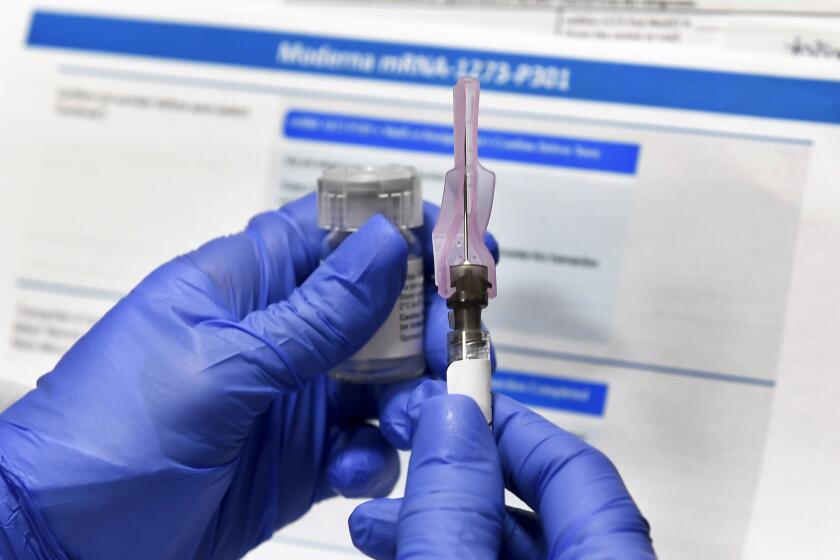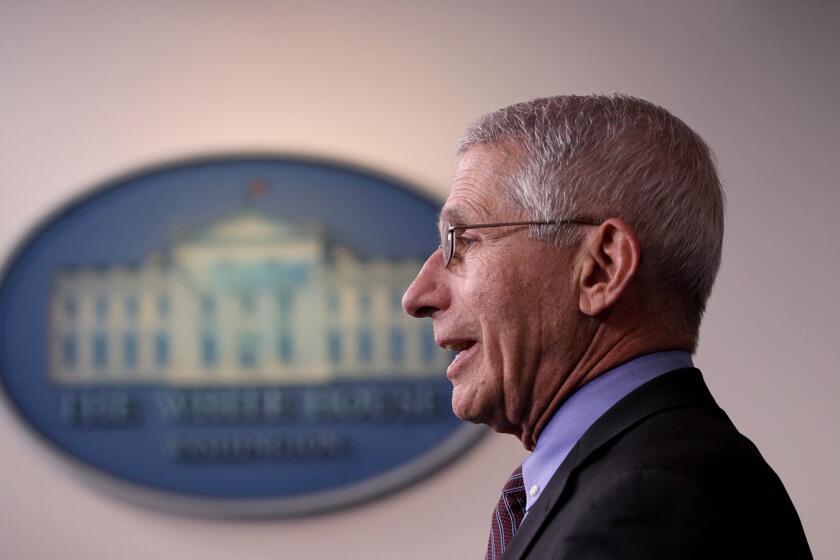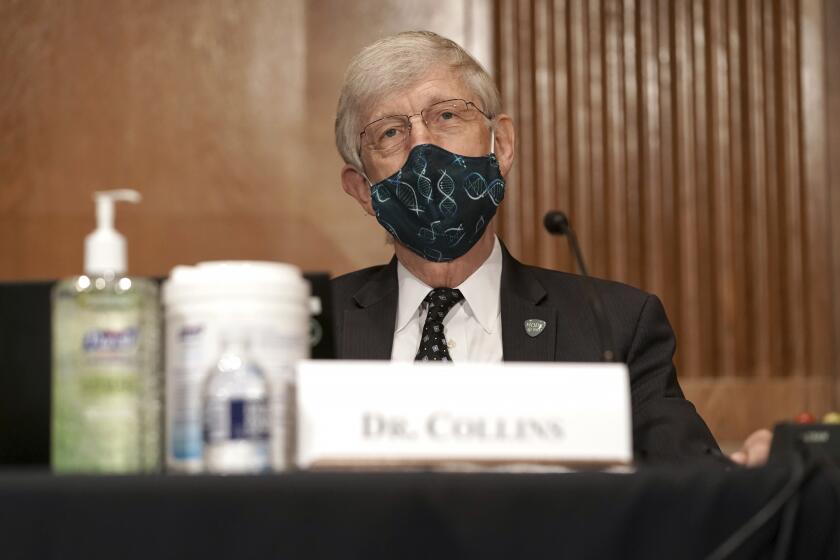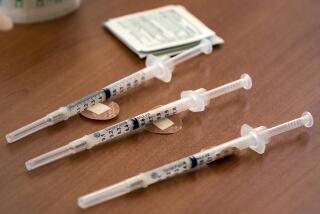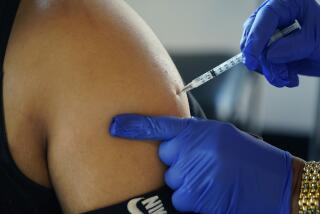Moderna releases COVID-19 vaccine trial plan as enrollment tops 25,000
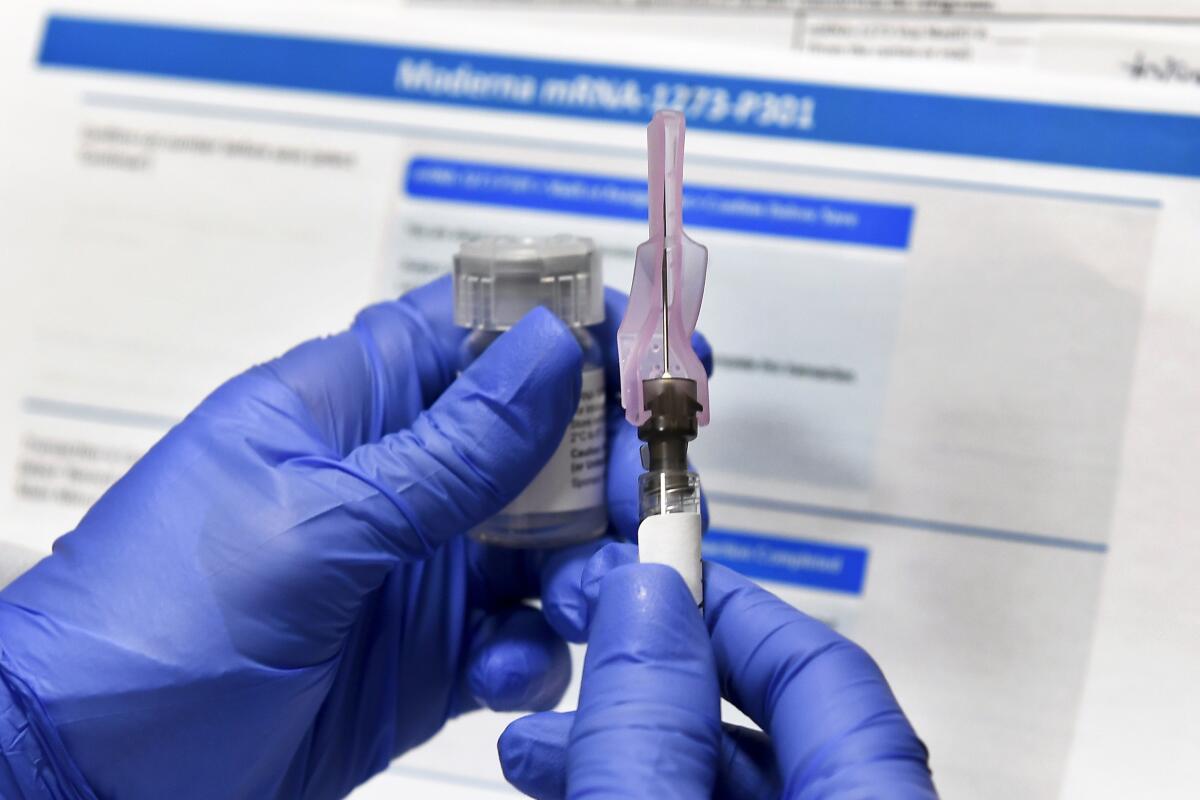
- Share via
Moderna Inc. released details of its plan for analyzing data from its COVID-19 vaccine trial, offering an unusual under-the-hood look at the study of a top vaccine candidate.
In a statement ahead of an investor meeting the company is holding on Thursday, Moderna says the trial has now enrolled 25,296 of an expected 30,000 volunteers, and more than 10,000 have received two doses of the vaccine.
While the broad outlines of major drug trials are available on a U.S. government website, details of how and when data-monitoring boards overseeing the trials plan to analyze data are often kept confidential by pharmaceutical companies.
The unprecedented push to get a vaccine to market quickly, however, has increased interest in those details. The analysis of findings and what the rules are for stopping a trial if there are encouraging early signals could determine how quickly a shot receives emergency authorization from U.S. regulators.
The shares gained as much as 3% to $70.90 in early trading in New York on Thursday. They’ve more than tripled since the beginning of the year.
Moderna decided to release its full trial plan to create public confidence that it was doing everything it could to ensure a vaccine was safe and effective, said Chief Executive Officer Stephane Bancel.
Top executives of nine drugmakers likely to produce the first coronavirus vaccines signed a pledge to boost public confidence in approved vaccines.
“We have been working nine months to try to stop this virus by getting a vaccine to market,” Bancel said in an interview. “We want to make sure the general public has trust in vaccines by being transparent.”
Bancel said the most likely scenario was that Moderna’s vaccine could generate preliminary efficacy data in November. It is “technically possible” for Moderna to get results in October, but that is unlikely, he said.
Under the Moderna plan, a data monitoring board will take a preliminary look at the efficacy results after 53 participants have contracted the coronavirus, and again after 106 cases are reached. The final analysis will occur after 151 cases, according to slides from the investor meeting.
Moderna’s plan is more conservative than the 32-case benchmark being used by Pfizer Inc. for its first preliminary analysis of the COVID-19 vaccine it’s developing with partner BioNTech SE. Pfizer has said conclusive efficacy results are likely by the end of October. The company didn’t immediately respond to a request for comment early in the day.
A COVID-19 vaccine could be available earlier than expected if ongoing clinical trials produce overwhelmingly positive results, Dr. Anthony Fauci said.
According to a slide being presented at the meeting, Moderna’s trial is only likely to generate clear positive results at the first analysis if it turns out to be very highly effective, reducing COVID-19 cases by 74% or more.
If the vaccine turns out to be a more modest 60% effective, the trial might have to proceed to the final efficacy readout to generate clear results, according to the 135-page trial protocol.
Vaccination timeline
Bancel said it was “extremely unlikely” everyone in the country could get vaccinated by the end of the first quarter of 2021, as a Trump administration official suggested on Wednesday. All three of the most likely initial vaccines are based on newer technologies, which means that the companies have had to create new manufacturing capacity, he said.
There will likely only be enough vaccines approved for every American who wants a shot by the second half of next year, according to Bancel.
Unlike an AstraZeneca PLC trial that has been put on hold twice to investigate possible neurological adverse events, Moderna’s trial hasn’t had any pauses to probe potential safety problems, Bancel said.
AstraZeneca’s suspension of testing of its coronavirus vaccine while it investigates an illness shows there will be ‘no compromises’ on safety, the NIH chief said.
The AstraZeneca vaccine trial in the U.K. resumed after a safety review was completed, while another AstraZeneca trial in the U.S. remains on hold. Documents sent to participants in the U.K. said the symptoms probably weren’t related to the AstraZeneca shot.
In an email, an AstraZeneca spokeswoman said it had “no update as of right now” on its U.S. trial design beyond details already available in the U.S. database, ClinicalTrials.gov.
